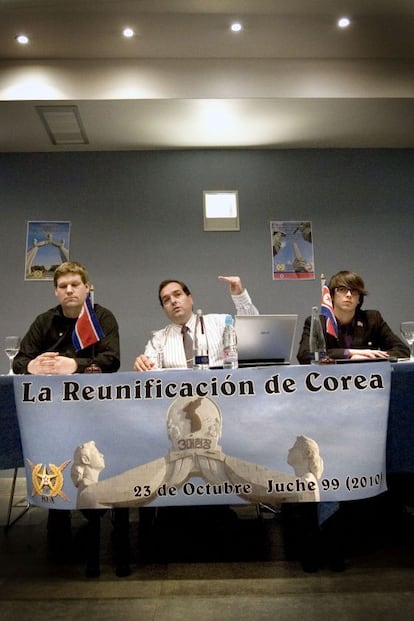North Korea’s Spanish mouthpiece
Cao de Benós tries to convince people that everything is rosy behind the Bamboo Curtain Aristocrat is Pyongyang's only foreign-born government official


Alejandro Cao de Benós’ chatter in defense of North Korean totalitarianism reminds one of the same babble used by one of Spain’s most famous hawkers, León Salvador (1875-1949), when he use to peddle hair combs to bald men.
“You must think I am crazy, but wait, I haven’t finished,” Salvador would tell a crowd perched from a stall in Pamplona. “With these same 100 pesetas that you will be purchasing a blanket made in Palencia with, I will also give you a modern pocket writing pen and a comb made from carey shell.” When people would laugh at his theatrical performances, Salvador would respond: “Laugh, people, laugh, but for every 15-peseta watch I sell you, I make 14 pesetas.”
Just like León Salvador — except without the same commercial success — Cao de Benós peddles fantasies. The Tarragona resident speaks of a North Korea that is democratic, happy, fair, and exemplary. If he feels cornered by counterarguments, he will threaten to hang up the phone. “The Western press is a great manipulator with its vampire stories,” he once said.
The La Pedraja de Portillo native is also known to be rude. “Go on kid, go see how a mother pees,” he said, again in the middle of a heated debate.
The press is there to educate the people, not confuse them.”
Alejandro Cao de Benós de Les y Pérez, now 38, was only 16 years old when he first met North Koreans in Madrid. “I identify very closely not only with President Kim Il Sung’s ideology but with the principles and moral values of the Korean people.”
He began spreading propaganda about North Korea in Spain by organizing conferences and events about the cut off Asian nation. His continued loyalty earned him the dubious honor of becoming North Korea’s first and only foreign-born government official. Cao de Benós serves as a special delegate to the Cultural Relations Committee Abroad for the Democratic Republic of North Korea.
When he appears before the press, he comes prepared with an arsenal of cunning but unconvincing arguments. Reporters frequently seek him out, as he is the only official willing to speak on record about the current events taking place behind the Bamboo Curtain, including whether there is any truth in the recent rumors that Ri Sol Ju, the wife of current leader Kim Jong-un, has given birth to an heir. She mysteriously showed up in public recently after a 50-day absence.
The following was an exchange Cao de Benós had with EL PAÍS last year:
Is there democracy in North Korea?
I identify very closely not only with President Kim Il Sung’s ideology but with the principles and moral values of the Korean people.”
“Of course, a people’s democracy, where there is no class structure.”
And political pluralism?
“This is what the enemy wants so that it can come in to infiltrate and destroy us.”
Is there a free press?
“The press is there to educate the people, not confuse them.”
Why isn’t Amnesty International permitted to enter North Korea?
“As with the United Nations, it is at the service of the United States.”
Do concentration camps exist?
“They don’t exist; they are centers for correcting moral and ideological values.”
Does homosexuality exist?
“It is respected, but in private. North Koreans are not effusive.”
Cao de Benós complains that he has been interviewed by CNN, Newsweek and Time, but none of these media outlets have broadcast or published his comments. He plays the upper hand in the knowledge that the information he conveys cannot be confirmed, so he demands evidence from his inquisitors to prove him wrong. He is a web page designer and organizes trips to North Korea via the internet for 2,500 euros, leaving from Beijing.
Manuel Ansede, a journalist for the daily Público website, recalls the recommendations Cao de Benós gave him when he took a tour of the closed nation. “For all purposes you are a veterinarian, with your own business in Madrid called Veterinario Ansede,” the journalist said Cao de Benós told him. “Our entry conditions are very strict for anyone connected to the world of journalism. Ninety-nine percent of visa requests from journalists are denied, while the remaining one percent take about four years to approve. And the visa goes for about 1,000 euros per day you are in the country. That is why it is better that you don’t mention you are a journalist.”
A descendant of the Baron of Les, the Count of Argelejo and the Marques of Rosalmonte, this Pyongyang propaganda man denies and justifies at the same time the repression of society by the country’s military leaders.
“This is a terrible police state,” a Cuban ambassador once told two journalists who snuck into the country in the early 1990s, hiding their true identities as Asian correspondents.
From the snooping around we were able to do, without any official tour guide buzzing around, we found nothing that corresponded to any of the tall tales the outrageous aristocrat sells back home.
Tu suscripción se está usando en otro dispositivo
¿Quieres añadir otro usuario a tu suscripción?
Si continúas leyendo en este dispositivo, no se podrá leer en el otro.
FlechaTu suscripción se está usando en otro dispositivo y solo puedes acceder a EL PAÍS desde un dispositivo a la vez.
Si quieres compartir tu cuenta, cambia tu suscripción a la modalidad Premium, así podrás añadir otro usuario. Cada uno accederá con su propia cuenta de email, lo que os permitirá personalizar vuestra experiencia en EL PAÍS.
¿Tienes una suscripción de empresa? Accede aquí para contratar más cuentas.
En el caso de no saber quién está usando tu cuenta, te recomendamos cambiar tu contraseña aquí.
Si decides continuar compartiendo tu cuenta, este mensaje se mostrará en tu dispositivo y en el de la otra persona que está usando tu cuenta de forma indefinida, afectando a tu experiencia de lectura. Puedes consultar aquí los términos y condiciones de la suscripción digital.








































